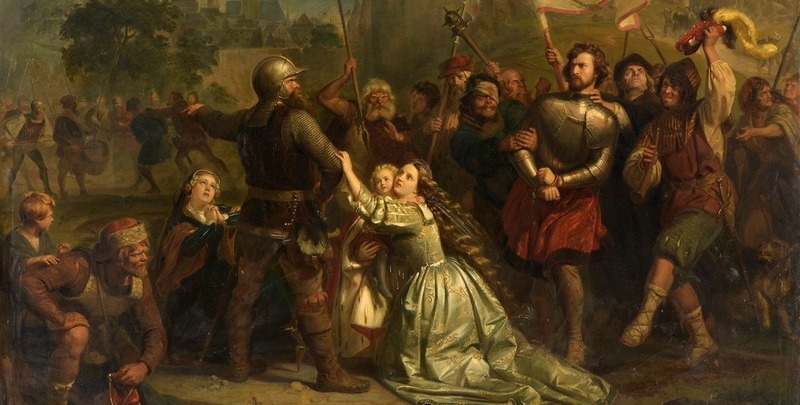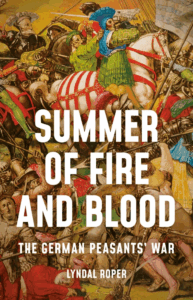
How the German Peasants’ War Exposed 16th-Century Europe’s Fragile Foundations
From Lyndal Roper's Cundill Prize-Shortlisted “Summer of Fire and Blood”
The German Peasants’ War was the greatest popular uprising in western Europe before the French Revolution. Like a vast contagion it spread from southwest Germany through Württemberg, Swabia, the Allgäu, Franconia, Thuringia, and Saxony to Alsace in what is now France, Austria, and Switzerland. Peasants massed in armed bands in one region, then another, and rebellion would break out even in areas far away. At its height it involved well over a hundred thousand people, perhaps many more, who joined with the rebels to bring about a new world of Christian brotherhood. And for several months, they won. Authority and rulership collapsed, and the familiar structures of the Holy Roman Empire were overturned, exposing the fragility of the existing social and religious hierarchies. People even began to dream of a new order.
But this moment did not last. In spring 1525, the ‘Aufruhr,’ or ‘turbulence,’ as contemporaries called it, had reached its height, rolling all before it. By May the tide had turned. The forces of the lords put down the revolt by slaying somewhere between seventy thousand and a hundred thousand peasants. That summer of blood, maybe 1 per cent of the population of the area of the war was killed, an enormous loss of life in just over two months.
The peasants’ side of the story has been forgotten because they did not write it down, either because they were illiterate or because they were slain or executed in the war.
Despite its enormity, the Peasants’ War and its bloody defeat have been forgotten in recent years. People remember the era for Martin Luther and his Reformation, which split Western Christendom forever between Catholics and those who would eventually be known as Protestants. The Peasants’ War has come to be seen as a diversion, an interlude important mainly for what it tells us about Luther, for this was the moment when Luther came out in support of the princes and against the ‘mad dogs’, the rebelling peasants. From then on, the Reformation in Germany would be conservative. Mainstream reformers would go on to ally with rulers to advance the goals of the Reformation, and when the new church was set up after the war, it would have the backing of those in power.
The Reformation’s possibilities, as well as its limits, cannot be grasped without an understanding of the Peasants’ War as the giant trauma at its center. Equally, the ideas, dreams, and hopes unleashed by the Reformation shaped the Peasants’ War. And the war, in turn, cannot be understood if it has been severed from the heady atmosphere of religious excitement in which it took place.
To understand why such a massive movement mushroomed from such small, apparently isolated beginnings in a distant corner of the empire, we need to listen to what drove the peasants. It is no accident that just three years after Luther defied the emperor and the estates of the empire, the peasants of first one or two lords and abbots decided to down tools and gather in bands.
In 1520 Luther himself had written a short but powerful tract, one of the three great Reformation writings from that year setting out his theology, titled The Freedom of a Christian. The cover of the German edition was emblazoned with the incendiary word ‘freedom.’ It was all very well for Luther’s supporters to argue later that he had meant spiritual freedom, but the fact was that many peasants in the southwest, particularly those ruled by the Catholic monasteries, convents, and abbots Luther was attacking, were serfs, owned by their masters. For them, freedom meant ending serfdom too. Despite Luther’s later condemnation, the Peasants’ War is unthinkable without the ideas he unleashed.
By standing up to the emperor, Charles V, at Worms in 1521, Luther had provided an unforgettable example of resistance. A lone monk in a borrowed cassock before an audience of dignitaries arrayed in all their finery, he had confronted the mightiest power in the land and had said his piece, refusing to recant unless convinced by ‘Holy Scripture.’ Small wonder that the peasants drew on his ideas for their cause. Small wonder they assumed he would support them.
But he did not. By late March of 1525, the peasant revolt had become a mass movement whose demands found shape in the Twelve Articles. These were probably composed by Sebastian Lotzer, a townsman and furrier, on the basis of hundreds of complaints that different groups of peasants had been formulating for weeks beforehand. Influenced by Martin Luther; the preacher Christoph Schappeler, himself a follower of the Swiss reformer Huldrych Zwingli; and a strain of radical evangelicalism, Lotzer helped transform a set of specific, apparently random grievances against particular lords into a wide-ranging theological vision that chimed with radical Reformation ideas.
Local spats could now feed into a mass movement that spread far beyond individual disputes between a peasant and a particularly nasty abbot or lord. Yet Lotzer did not invent this theology, nor was he the first to apply it to agricultural relations—that had already been done by the peasants themselves as they formulated their complaints. The Twelve Articles then became a document that the movement everywhere acknowledged, even when the rebels did not know exactly what the articles contained, and even though many areas revised them to suit local circumstances. Soon they were printed using the new technology made possible by the invention of movable type, and they spread all over Germany. You could pick them up and hold them in your hand, point to each demand and the biblical passages that proved their godliness.
The key thing about the Peasants’ War was that it was a mass movement. For too long, histories of the war have emphasized its leaders, men like Thomas Müntzer in Thuringia, adopted by Friedrich Engels and then by the East German regime as a revolutionary hero to rival the reactionary colossus Luther. There are indeed a series of outsize characters who populated the war: Götz von Berlichingen, the knight with the iron fist, who became a peasant leader after his mother-in-law failed to hand him his liege-lord’s summons to fight against them, or so he later claimed in his mendacious autobiography, written in his nineties. Or Florian Geyer, a noble who also led peasant armies and was finally knifed by an assassin. Or the Black Hofmännin, a peasant woman who claimed she urged on the peasant troops and rubbed the fat of the slaughtered nobles onto her shoes. Or the ‘Bauernjörg,’ Truchsess Georg von Waldburg, who led the lords’ army of the Swabian League and mercilessly torched rebel villages.
But this was a movement, not a drama of Great Men. The peasants’ side of the story has been forgotten because they did not write it down, either because they were illiterate or because they were slain or executed in the war. The winners—the lords and mainstream theologians who were the peasants’ enemies—instead wrote the history.
The passions and dreams that drove the movement can seem inchoate, naïve, and contradictory. Though historians have tried to distil the movement’s ideology from the programmatic writings of some of its leaders, this was not a revolt driven by the literate few. It was a mass struggle by individuals who risked and lost their lives to try to bring about a new world. To reconstruct what they did, what they said, and what they wanted to achieve, this book ranges widely to follow the turbulent flows of vast numbers of people.
This was not a revolt driven by the literate few. It was a mass struggle by individuals who risked and lost their lives to try to bring about a new world.
The vision that drove them was about humans’ relationship to creation. They were angry that lords claimed ownership of natural resources—the water, the common land, the woods and forests—when these were God’s creation, given to all. They were enraged that the lords had stolen their freedom and claimed to own them when, as Luther showed, Christ had bought us all with his precious blood, “thus the Bible proves that we are free and want to be free.” They were incensed by the growing inequality they saw around them, as individuals like the Fuggers, the richest merchants in the world, amassed wealth on scales never seen before. They wanted men to live as brothers, in mutual obligation, and not as lords and serfs. Theirs was an unabashedly male ideal, nourished by bonding amongst the peasant fighters, though this does not mean that women did not support it too. They wanted decisions to be made collectively and to manage natural resources in a way that would respect the environment, which God had created.
To understand their revolt, we need to recall a world where animals such as oxen, horses, cows, pigs, sheep, and poultry lived closely with people, and where the vagaries of the weather mattered in a way that modern generations have often forgotten. The relationship between labor, harvest, and food was obvious, rather than mediated by powerful firms and complex industrial processes. The energy to drive machines came from water, from wood, and from charcoal, and it was clear who owned these resources and evident when they restricted access to them.
Despite the forces ranged against them, for most of the war the peasants were nonviolent; they humiliated but did not kill their lords. They questioned the established order at just the moment when capitalism was expanding and when Europeans were encountering new worlds, but they did not necessarily want to destroy authority of all kinds. Yet the authorities destroyed them, obliterated their movement, and built the structures of the current world on its ashes.
The peasants’ story matters. It can help us see new answers to questions that confront us today. It also discloses a radical Reformation, whose theological, social, and political vision could have taken history in a very different direction. This is the Reformation we have lost sight of, and this is why we need to understand what drove the peasants. For what mattered to them also matters to us.
__________________________________

From Summer of Fire and Blood: The German Peasants’ War by Lyndal Roper. Copyright © 2025. Available from Basic Books, an imprint of Hachette Book Group. Summer of Fire and Blood has been shortlisted for the Cundill History Prize.
Lyndal Roper
Lyndal Roper is Regius Professor of History at the University of Oxford. Her previous books include Martin Luther and Witch Craze. She is a fellow of the British Academy, a fellow of the Australian Academy of the Humanities, and a fellow of the Berlin-Brandenburgische Akademie der Wissenschaften. She lives in Oxford, South Wales, and Berlin.



















